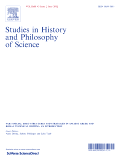
STUDIES IN HISTORY AND PHILOSOPHY OF SCIENCE
Scope & Guideline
Illuminating the Historical Contexts that Shape Science
Introduction
Aims and Scopes
- Historical Contextualization of Science:
The journal emphasizes the importance of historical context in understanding scientific developments, exploring how past events, societal norms, and philosophical ideas shape scientific practices and theories. - Philosophical Analysis of Scientific Concepts:
A core aim is to critically analyze philosophical concepts related to science, such as causation, realism, and the role of values in scientific inquiry, contributing to a deeper understanding of scientific methodologies. - Interdisciplinary Approaches:
The journal promotes interdisciplinary research that integrates insights from history, philosophy, sociology, and the natural sciences, fostering a comprehensive understanding of scientific phenomena. - Critical Examination of Scientific Practices:
There is a consistent focus on examining the practices of scientists, including methodologies, experimental designs, and the ethical implications of scientific research, in order to enhance the discourse on scientific integrity and accountability. - Exploration of Emerging Themes in Science:
The journal is dedicated to exploring emerging themes in science, such as the implications of new technologies, the evolution of scientific theories, and the societal impacts of scientific discoveries.
Trending and Emerging
- Ethics and Values in Science:
Recent publications show a growing interest in the ethical dimensions of scientific inquiry, including discussions on vaccine hesitancy, public trust in science, and the role of non-epistemic values in research. - Interdisciplinary Methodologies:
There is a trend towards employing interdisciplinary methodologies that draw from various fields such as sociology, anthropology, and environmental studies, highlighting the complexity of scientific inquiry in a global context. - Impact of Technology on Science:
Emerging themes focus on the impact of technology on scientific practices, including computational methods, big data, and machine learning, and their implications for scientific reasoning and evidence. - Narrative and Historical Contexts:
A significant trend involves the use of narrative approaches to understand the historical context of scientific developments, emphasizing the importance of storytelling in the philosophy of science. - Public Engagement with Science:
There is an increasing emphasis on public engagement and the communication of science, exploring how scientific knowledge is disseminated and perceived by broader audiences.
Declining or Waning
- Traditional Scientific Realism:
There has been a noticeable decline in discussions centered around traditional notions of scientific realism, as newer frameworks and critiques have emerged, leading to a reevaluation of how scientific theories are perceived and validated. - Historical Determinism:
Themes associated with historical determinism, which suggest that scientific developments follow a predetermined path, have waned as scholars increasingly recognize the role of contingency and unpredictability in the evolution of scientific ideas. - Focus on Individual Scientists:
The journal has shifted away from biographical studies of individual scientists, reflecting a broader trend towards examining scientific communities and collective practices rather than isolated contributions. - Metaphysical Speculation:
There is a decreasing emphasis on speculative metaphysical discussions that do not directly engage with empirical science, as the journal moves towards more grounded analyses that connect philosophy with scientific practice.
Similar Journals

Journal for General Philosophy of Science
Innovating Perspectives in the History and Philosophy of ScienceJournal for General Philosophy of Science, published by Springer, stands as a pivotal resource in the fields of History and Philosophy of Science, as well as general Philosophy. With an impressive Q1 ranking in its categories and a solid reputation reflected in its Scopus rankings, this journal provides a robust platform for scholarly discourse and advancement in philosophical inquiry regarding science. The journal's commitment to quality is evident, catering to researchers, professionals, and students interested in the critical examination of scientific methods, theories, and their implications. While it operates on a subscription basis, the journal is dedicated to fostering a deeper understanding of philosophical issues surrounding scientific practices from 1980 through 2024. Operating out of the picturesque Netherlands, specifically from VAN GODEWIJCKSTRAAT 30, 3311 GZ DORDRECHT, the journal continues to encourage innovative thinking and interdisciplinary dialogue, underscoring its significance in academia today.

Revista Colombiana de Filosofia de la Ciencia
Connecting Researchers and Ideas Across BordersRevista Colombiana de Filosofia de la Ciencia, published by UNIV EL BOSQUE, stands as a pivotal platform for the dissemination of knowledge in the field of philosophy of science. With a commitment to open access since 2010, this journal not only enhances the accessibility of crucial scholarly work but also encourages collaboration and dialogue among researchers, professionals, and students alike. Featuring an ISSN of 0124-4620 and an E-ISSN of 2463-1159, the journal fosters critical discussions on the implications and underpinnings of scientific thought, promoting an enriched understanding of how philosophical frameworks can shape scientific practices. The journal aims to bridge disciplines, inspiring new research pathways while contributing to the philosophical discourse surrounding science in Latin America and beyond. This dedication places the Revista Colombiana de Filosofia de la Ciencia as a leading voice in its field, making it an essential read for anyone looking to deepen their engagement with the philosophy that informs scientific investigation and theory.

Metode Science Studies Journal
Advancing the Dialogue Between Science and PhilosophyMetode Science Studies Journal, published by UNIV VALENCIA, BOTANICAL GARDEN UV, is an esteemed open-access journal dedicated to advancing scholarly discourse in the fields of history and philosophy of science and multidisciplinary studies. Since its inception in 2013, the journal has positioned itself as a vital resource for researchers, professionals, and students, fostering an environment for innovative research and cross-disciplinary dialogue. Based in the vibrant city of Valencia, Spain, this journal aims to publish high-quality articles that explore the intricate relationships between scientific practices and philosophical inquiries. With a current impact factor demonstrating its relevance in the academic community, the journal is indexed in Scopus, ranking in the 52nd percentile for history and philosophy of science and the 33rd percentile for multidisciplinary studies. Scholars can access a breadth of research outputs that span from 2015 to 2024, thereby contributing significantly to the intellectual landscape of the respective fields.
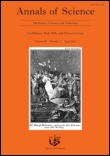
ANNALS OF SCIENCE
Charting the Course of Scientific Ideas Through TimeANNALS OF SCIENCE, published by Taylor & Francis Ltd, is a pivotal journal in the field of the History and Philosophy of Science, as evidenced by its Q3 categorization and a respectable Scopus rank of 99 out of 223, placing it in the 55th percentile among its peers. With a rich history dating back to its initial publication in 1936, the journal has made significant contributions to scholarly discourse, providing a platform for researchers and academics to explore the intricate connections between scientific developments and philosophical inquiries. The journal's commitment to rigorous academic research ensures that it remains a vital resource for professionals, educators, and students dedicated to understanding the evolution of scientific thought. Although it operates under traditional subscription models, the journal's importance in shaping modern scientific discussions cannot be overstated, making it an essential read for those engaged in the multifaceted study of science's history and philosophical implications.
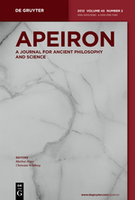
Apeiron-A Journal for Ancient Philosophy and Science
Illuminating Ancient Wisdom for Modern MindsApeiron - A Journal for Ancient Philosophy and Science is a distinguished academic journal published by Walter de Gruyter GmbH, based in Berlin, Germany. As an essential platform for scholars in the fields of History and Philosophy of Science and Philosophy, this journal holds a prestigious Q1 ranking in both domains as of 2023, reflecting its significant impact and contribution to these disciplines. With its ISSN 0003-6390 and E-ISSN 2156-7093, Apeiron aims to foster interdisciplinary dialogue by publishing original research, reviews, and critical essays that explore the rich intersections of ancient thought and scientific inquiry. As the journal converges into its fifth year from 2019 to 2024, it offers a vital resource for researchers, professionals, and students seeking to deepen their understanding of classical philosophical traditions and their relevance to contemporary science. Although it operates under a subscription model, the rigorous peer-review process ensures that each publication maintains the highest academic standards, thus solidifying Apeiron's status as a pivotal resource in its field.
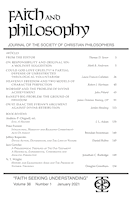
Faith and Philosophy
Challenging Minds, Inspiring Faith through PhilosophyFaith and Philosophy, an esteemed journal specializing in the interdisciplinary realms of philosophy and religious studies, is published by the Philosophy Documentation Center. With an impressive ranking of Q2 in Philosophy and Q1 in Religious Studies for 2023, as well as a notable placement in the 85th percentile in Scopus' Religious Studies category, this journal serves as a vital forum for scholars and practitioners alike. Covering a diverse range of topics from metaphysical inquiries to ethical discussions, Faith and Philosophy aims to foster dialogue and deepen understanding within the context of faith and reason. Although it does not currently offer open access options, the journal continues to attract a wide readership with its rigorous academic standards and commitment to advancing philosophical discourse. Addressing complex questions that bridge tradition and contemporary thought, Faith and Philosophy is essential for anyone interested in the intersections of faith, reason, and critical inquiry.
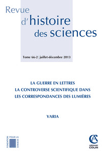
Revue d Histoire des Sciences
Exploring the Nexus of Science and History.Revue d'Histoire des Sciences is a distinguished academic journal published by Armand Colin, focusing on the intricate interplay of history and philosophy within the sciences. Since its inception in 1973, the journal has served as a vital platform for researchers, scholars, and students interested in exploring the historical dimensions of scientific development. With an ISSN of 0151-4105 and an E-ISSN of 1969-6582, this journal is recognized within the academic community, achieving a modest 2023 Scopus ranking of Q3 in History and Philosophy of Science, positioning it within the 41st percentile of its category. The journal offers a prestigious space for rigorous discourse, critical analysis, and innovative research aimed at advancing our understanding of the scientific enterprise's past. While it operates under a traditional access model, the ongoing commitment to rich scholarly content ensures that the contributions will resonate with those dedicated to the intersections of history, science, and philosophy, providing insights into how historical context shapes scientific inquiry and advancement.

Spontaneous Generations-Journal for the History and Philosophy of Science
Connecting Generations of Thought in Science and PhilosophySpontaneous Generations: Journal for the History and Philosophy of Science is a dedicated publication focusing on the rich fields of history and philosophy within the scientific domain. Published by the Institute for the History and Philosophy of Science and Technology, this journal provides a vital platform for scholars, researchers, and students to explore and disseminate ideas that bridge the historical context and philosophical inquiries of scientific practices. With its commitment to open access, Spontaneous Generations ensures that groundbreaking research is widely available, fostering an environment of collaboration and knowledge sharing. Aiming to engage a diverse audience, this journal is pivotal for those looking to understand the evolution of scientific thought and its implications on contemporary issues, making it an essential resource in the academic community.

HISTORY AND PHILOSOPHY OF THE LIFE SCIENCES
Fostering Interdisciplinary Dialogue in Life Sciences ScholarshipHISTORY AND PHILOSOPHY OF THE LIFE SCIENCES, published by SPRINGER INT PUBL AG, stands as a leading peer-reviewed journal dedicated to exploring the intricate relationships between historical narratives and philosophical frameworks in the life sciences. With its robust impact factor and recognized position as a Q1 journal in key categories such as Arts and Humanities, History, and History and Philosophy of Science, this journal provides a vital platform for researchers, professionals, and students seeking to delve into the theoretical underpinnings and historical trajectories shaping contemporary life sciences. Established in 1979 and evolving through its converged years until 2024, it reflects the journal's enduring commitment to advancing scholarly discourse in its field. While the journal is not open access, it nonetheless attracts a diverse readership, facilitating meaningful research exchanges and interdisciplinary dialogues. Located in the picturesque country of Switzerland, the journal invites contributions that foster critical examination and innovative thinking in the historiography and philosophy of life sciences, ultimately enhancing our understanding of this dynamic and significant discipline.
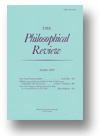
PHILOSOPHICAL REVIEW
Where Philosophy Meets ImpactPHILOSOPHICAL REVIEW, published by DUKE UNIVERSITY PRESS, is a leading academic journal in the field of philosophy, recognized for its rigorous scholarship and impactful contributions to theoretical and applied philosophy. With an impressive Q1 ranking in the 2023 Scopus metrics, it places within the top percentile of philosophical journals, affirming its significance in the discourse. The journal, which has a rich publication history since its inception in 1970, focuses on a diverse range of philosophical topics, catering to a broad audience of researchers, practitioners, and scholars. Although it doesn't offer Open Access options, its articles remain highly sought after for their depth and quality. With a dedicated readership and a commitment to exploring fundamental philosophical questions, PHILOSOPHICAL REVIEW continues to shape contemporary philosophical thought and engage with pressing issues in various domains.